In late January or early February, I got a letter in the mail (since discarded), addressed to "Dalhousie neighbour" (red flag #1), inviting me to something called "NextDoor Dalhousie", which claimed to be a social media site to "connect with neighbours". Sounds nice enough, but obviously somebody's making enough money off of of this "free" app to afford to mail out physical invitations. I've since discarded my letter, but here's a similar one received by a neighbour on Eccles Street in March, 2022:
The top level takeaway—in case the reference to red flags wasn't clear enough—is don't bother signing up, but for the sake of others who, like me, wanted to know more about it before signing up, here's what I've observed after having been signed into the site for a month.
Here's another example letter from someone around the corner from the person who received the one above:
THE PITCH
The website gives very little information about itself on its main page (red flag #2). The screenshot below is pretty much everything, and an about page linked in the footer regurgitates essentially the same material:
In brief, it essentially claims to be a souped-up amalgam of a neighbourhood group chat and hyperlocal Kijiji/Craigslist where people are 'verified' to be neighbours.
The Canadian localization includes a version intended for "Public services across the country", where government officials can target messages to a specific geographic area. The page includes testimonials from various police services (red flag #3) in Britain (oops!):
There is also a version for business that lets local businesses promote themselves to their neighbours. The site includes a promotion with RBC Royal Bank that ends on November 9, 2020 (sic).
The main US site is very similar, except it uses the US spelling of "Neighbor" and there is an "Agencies" category instead of "Public Services" and a fourth category, "Nonprofits", for organizations that are "Looking to Buy or Sell for Good".
THE RESEARCH
I had a few questions that I still needed to sort out, so I did some additional research:
How do they define the boundaries of the neighbourhood group to which I am invited?
There's a Facebook group for people who live within a couple of blocks of a local park (which I'm not a part of because I don't use Facebook, but I'm aware of the group's existence). Is this even more local than that, like just for my street? My block? I would not be able to find out until I signed up. The use of the name "Dalhousie", echoing the Dalhousie Community Association (on whose board I sit), was interesting though (I live in the west end of Somerset Ward). Props for not calling us "West Centretown" like the real estate industry does.
Who is this person inviting me to this website?
Having been involved in community things for a long time, I searched my emails for the so-called "neighbour's" name—which helpfully was not a common name like "Smith", "Leblanc", or "Singh"—at the bottom of the letter, and drew up nothing. Probably not an established community organizer. Maybe a new one? Nope. Their name turned up no results on a Google search either! I'm deliberately omitting their name from this post, for reasons that will become clear later.
How do they make money?
This is always an important question to ask, however, given that this is a social media site, the answer can be presumed: they want you and your neighbours to use it so they have an audience for advertisers. If they don't have advertisers or participants yet, they're operating at a loss to build readership. That's just how business works for social media sites trying to broach into a new market.
What the heck is this Nextdoor thing anyway? Is it legit? A scam?
This was, of course, the most important question. As mentioned above, their website brought up little information. The closest I could find to a mainstream review was a Buzzfeed article called How Nextdoor Became *The* Platform For Scammers To Rip Off Your Parents.
The remaining search results consisted of posts on review sites, where about half of the mostly US-based commenters complain about right-wing racists, and the other half complain about being kicked out by left-wing censors for 'just asking questions'. Many complaints also indicate that the site is a social media site for snitches (which certainly puts the Police use of it into context). I've also since been made aware of a Twitter account called Best of Nextdoor, that rags on some of the more outlandish posts on the site.
There is, however, one scathing blog post, from someone who has been on the site since 2017, entitled The Nextdoor Website Is Not Safe, Useful, nor Pleasant. A Negative Review. The Google search results for that blog post, which actually pulls from an anonymous comment instead of the main blog post, gives about the most concise advice, which is "It's only as good as the people who run it in each area."
Given that advice, I could tell that the only way to find out what Nextdoor means in my little neighbourhood of Ottawa is to join it.
SIGNING UP
So a month ago, I joined the site, using the code in the letter that they said would expire in 7 days (though I'm pretty sure I waited longer than that). I didn't document the process at the time, but going by memory, I recall that they asked for my name, address, and birthdate. I don't recall anything beyond that to 'verify' my residence in the neighbourhood (I suppose the code I received in the mail did that?). I can't remember if I had to choose the neighbourhood or if it was automatically selected based on the code.
Next, I was asked if they could use my name to promote Nextdoor to my neighbours, including in mailed letters. Worryingly, this interface is designed to make the default setting to grant permission (the "Not now" link is off to the top right, instead of a button of equal stature to the "Confirm" button), so people joining this site who are not technically proficient could agree to this not reading it carefully, and have their name and street inadvertently mailed out to others in their neighbourhood (as was the case with the neighbour who 'sent' the letter I received). I didn't get a screenshot when signing up, but the "invite" icon next to my profile name lets me invite people by mail for free:
Last, I was brought to the main page, with a pre-drafted post introducing myself that I could edit and then post. While it certainly gives the impression that you have to post this—before you even see who is on there and what the site is about!—to complete your registration, there is a mechanism to skip posting it and go straight to the feed, which I found and utilized. One person mentioned that they thought they had to post in order to gain access:
THE MAP
Once I got in, I could finally learn the answer to my initial question: what are the boundaries of this "Dalhousie" group? As it turns out, pretty large, and not too far off from the DCA's boundaries. The "Dalhousie" neighourhood, and others in central Ottawa-Gatineau, are in the map below, which I've marked up to make the boundaries clearer: Lucerne-Sud, Hull-Sud, Île de Hull, Westboro, Tunney's Pastures (sic), Hampton Park, Mechanicsville-Hintonburg, Civic Hospital, Dalhousie, Centretown, Centretown South*, Golden Triangle, The Glebe, Byward Market, Sandy Hill, Ottawa East [sic], Old Ottawa South, Carelton University (sic), Vanier South-Hurdman's Bridge, Overbrook, Riverview Park, Faircrest Heights. (*When I joined a month ago, I swear this was called "Centretown West")
I'm not sure where they got the boundaries from. Certainly not Nick Taylor-Vaisey's excellent Map of Ottawa's Community Association boundaries (the only one I've ever seen to correctly portray the overlap in the Centretown Community Association's and Dalhousie Community Association's boundaries), and I thought maybe from the Ottawa Neighbourhood Study, which had to divide up neighbourhoods in a way that worked for their statistics, but that map is even weirder than Nextdoor's. There is some similarity to the "Neighbourhood Equity Index" layer on the City of Ottawa's GeoOttawa map, so maybe it was provided by someone in the City's communications department.
The boundaries of Nextdoor's Dalhousie neighbourhood isn't too far off from Nick's (above), though it ends at Bronson instead of Bay north of the Queensway, and the section south of the Queensway is lumped in with the Civic Hospital neighbourhood. Reasonable boundaries for a community association, but for a "hyper-local" social media site, they're a lot bigger than the neighbourhood Facebook group. Maybe for a low-density suburban development, but not a dense urban area.
I speculate that communities can request to be hived off upon request, like how Hampton Park appears to have been from the Tunney's Pasture[s] 'neighbourhood'.
DIVING IN
The view I was brought to upon logging in (and which was about as far as I went the first time) had a list of posts to the left of the map, most of which were the default "Hello" messages that users are prompted to create. Some people include details about themselves, others just post the default message:
There were a few messages offering help or linking to local events, unanswered.
There aren't to many of the 'snitch' type message Nextdoor is known for, but I did find this cluster of them in Fall 2020:
The "Dalhousie" group's earliest posts, which don't take long to get to, were written in November 2019 by a couple I know on Twitter whom I know to be anti-'snitch'. One posted and bailed after "about 5 minutes" and the other—whose profile is labelled as a 'founder' of the Dalhousie group, unbeknownst to them—posted a couple of public events in 2019 and stopped using the app after seeing nothing of value. The neighbourhood boundaries were already established when the 'founder' joined the group, leaving unresolved the question of how they were set and by whom.
KEEPING IT IN THE COMMUNITY?
So how does this site really measure up as a hyper local social media platform? Nearly all of the messages in the "Dalhousie" neighbourhood dashboard are "Hello" messages that people post for their first, and possibly only, time visiting the site, and many people mention what street they are on in an earnest attempt to engage with the community that they haven't yet seen.
While some posts are only sent to the "Dalhousie" neighbourhood, you can see in the screenshots above that many new messages are posted to the "General" list of 9 neighbourhoods that I'm "following" by default (including one that extends all the way to Aylmer, QC). Zooming out from the "Dalhousie" neighbourhood dashboard back to the home screen, we see messages from people in my and other neighbourhoods who have posted to "Dalhousie", "General" or "Anyone" (the last of which is undefined but I've seen posts from people as far away as Lincoln Heights-Britannia, Queensway Terrace North, and Aylmer-Deschênes)
In this Home view, the ratio of 'hello' messages drops and we see many other messages posted by people, mostly in other neighbourhoods across Ottawa-Gatineau, who send their message to "Anyone" instead of "General" (I later found a profile setting to show or hide posts "beyond nearby", which of course is default enabled). You can click on their neighbourhood name and see the feed of messages sent to that group, which seems to defy the implication that this is a "secure environment" to communicate with your immediate neighbours if anyone can just go in and check out your own community's discussions.
Most of these messages are people offering house cleaning and other services, or selling things (either Kijiji style for people unloading unneeded materials, or Etsy style for people who make things to sell).
Despite how few messages are in the "Dalhousie" neighbourhood list, on the right side of the main screen (above) it says "Dalhousie has 265 groups". That's a lot of groups!
The list of groups includes "Local Deals", "Indians in Orleans", and "South Keys Singles 60+". Most are configured to apply to "All of Ottawa" and permit people "outside this area" [Ottawa] to join, which suggests Nextdoor is more of a general purpose social media site that uses the community angle as its hook.
KEEPING YOU COMING BACK FOR MORE
Speaking of hooks, when you sign up for the site, you are automatically subscribed to email notifications. I've been getting about two emails daily, one a "Top post" message which is mostly a digest of (mostly "Hello") messages in the Dalhousie view...
...and the other that just has a single post, often people in other neighbourhoods who are trying to start a new business:
A social media site is only as good as it can get people back onto the site, and it seems to do a good job of encouraging people to write new posts, including this frequent poster:
I held off unsubscribing from these notifications as research for this blog post, but I just now clicked the "Unsubscribe" link on the "Top Post" message and got this notification that I will no longer receive Digests. I forgot to keep track of red flags since the start of this post, but the fact that they don't even hint that there are other things to unsubscribe from or where to do it might be the biggest one of all!
So I clicked on my profile icon, selected "Settings", then "Notifications", and found all of these notification types to disable, each of which I have to disable individually. I could barely get all the notification types to fit in one screenshot:
But wait, there's more! Each of those links on the left has a list of notification types to disable, for a total of 30 notification types in 10 categories, plus these 5 Public services (two of which are Nextdoor), each of which has two categories of notification, "New Posts" and "Emergency alerts".
There's also the privacy settings, which gives a reasonable amount of granularity for choosing what gets displayed to whom, but each has to be set individually, and can only be done after you've been pressured to make your first post on the site:
That's a lot of notification types and settings to disable, for a social media platform I'm likely to forget about anyway, so why not finish the cycle and try to deactivate my account. When you choose to "Deactivate account", you have to select from a list of reasons to display the "Deactivate" button. If you select the first reason, "Received too much email," they show a link to the email preferences (I selected "Privacy Reasons").
Upon deactivation of the account, this email gives fairly clear information about what that means... (and, of course, a link to reactivate the account!)
...but nothing about deleting the account! It appears that creating an account is a permanent thing. So far, a few days later, I haven't received any more emails from Nextdoor, so at least there's that.
CONCLUSIONS
In case it isn't clear, I'm certainly NOT promoting the app, and nobody asked me to write this. To be honest, I didn't really intend to stay registered with this site. I was curious and wanted to fill the gap in resources that would have helped me understand what it was about before signing up.
The only social media I use is Twitter (which certainly has its own flaws) partly because posts are public by default, so when I post a Tweet I am aware that it could be seen by anyone, anytime. (Despite this, Twitter manages to mostly be an echochamber anyway.) I also like that I can embed tweets in blog posts, or share links to them by email, without the recipipent needing to create an account to view it.
This is not to deny that there are people who rely on walled-in platforms to socialize while simultaneously protecting themselves from abuse. And maybe Nextdoor will turn out to be useful for some people in Ottawa; I don't want to bust anyone's party. And if anything, it is a benefit that that Nextdoor is not Facebook (but I'm sure they'd want to be as intrusive in all aspects of life as Facebook if they were big enough), and it is focused on geographic community (so family and neighbour groups don't get intermingled).
But I mainly joined the site for research purposes; to find out the answers to the questions I had and couldn't find the answers to. What are the boundaries of my neighbourhood according to them? Too broad for the number of people using the site. Who's using it? Mostly people I already interact with elsewhere. What will I find there? Mostly fluff and ads. Do I want to join it? No.
Maybe the community association email list is an outdated format for organizing, but this doesn't look like the alternative. For better or worse, the site is too sparsely populated in Ottawa—and in Dalhousie in particular—to be of any significant use. Thankfully I didn't see any hateful or racist imagery or messages in this corner of the site which online reviews would have one believe is a majority of the content (the most controversial thing I saw was someone complaining at the height of the Convoy occupation that "this sight is getting too political" with a few replies saying "no it isn't" and "it's spelled 'site'"). There were only a handful of snitchy comments (including one "Is this your kid" photo of a doorbell cam screenshot from somewhere in Gatineau), though I expect that if the app's uptake were stronger in Ottawa, the chances of conflict and/or snitching would increase too.
Ultimately, the skeeziness is what gets me most: requiring people to join to even get an idea of what it's about, sending letters "from" neighbours who probably didn't realize their name would be on it, making it look like you have to post a "hello" message before even seeing the site for the first time, subscribing to dozens of different notification types which must be unsubscribed from individually, and not actually letting you delete your profile.
So, if I want to talk to my neighbours, instead of Nextdoor, I'll just go next door.
![A paper letter starting Hi Eccles St Neighbours, Our neighbourhood is now using a free app called Nextdoor Dalhousie and you should join us. There's a code that it says will expire in 7 days, and it's signed Your neighbour, [name and street name removed by me]](https://blogger.googleusercontent.com/img/a/AVvXsEg5rokjBpaCuPrF1NFwmQawJQKo4YGGRWN8G8MranVAFgfnWekrTxYvrRDWuh-aE1_G-3SCC6MdhG43RCeBv7bAGeSG6yulDZq0pbHf2ltZyBOo_y3s2rZehygPoKoGVzmHd5n5rra7KcAT77yJbdEOig44DVYg9X_UW_zrJ9pAxsxpohnwcNR5XZ3q=s400)
![A paper letter starting Hi Rochester St Neighbours, Our neighbourhood is now using a free app called Nextdoor Dalhousie and you should join us. There's a code that it says will expire in 7 days, and it's signed Your neighbour, [name and street name removed by me]](https://blogger.googleusercontent.com/img/a/AVvXsEiEsGc87sf6_sdIZDRdVyF3fAsF3TL6zTkHzStJIXz_cUUGzvX2_j3pHy8IOKAAsu_cUghuJt3OmbDeQ7jjdQ-i1_iVIpFj3X0H94OIdbnxxK38NSiHo1yzAG3JJmvrYSFNeUQd20eQt5AW1qnX_c-I6KchAf1C_3bp_Ic7hyrxXwxQTRN4JhGvYcBR=s400)
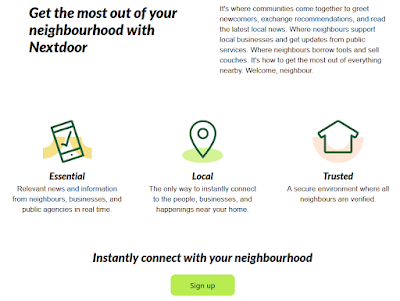


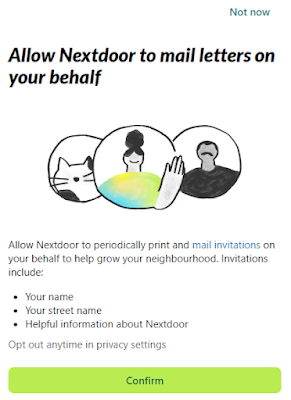


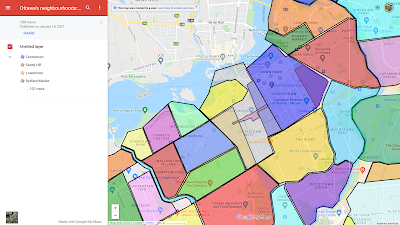
![Screenshot of a Nextdoor post that says 'Hi I'm [name]. Nice to meet you. Just a friendly note saying hi.'](https://blogger.googleusercontent.com/img/a/AVvXsEhoKgS3eWWNG_s8M9bzvn9tiYuQ_7lGa-MQOdUZ7uvacnAqId4b3d6YY-GrDkro5kiSK9umGhra8SGtolT-h8fbLym7KQmGjc4JJjZ-uhhsAlyyNiAj_Cl6ZkLTO7e5unVziuGWTIKDwPEEV4SO8xQ_EmGClyhdHUmBXPVNaM1ccUyRAj4VLSlL-mts=s400)


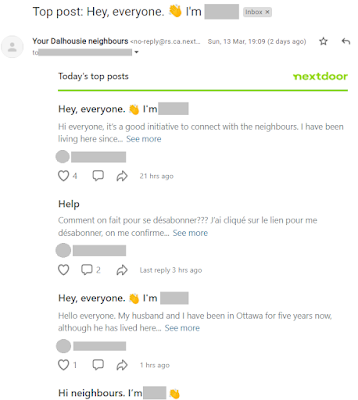
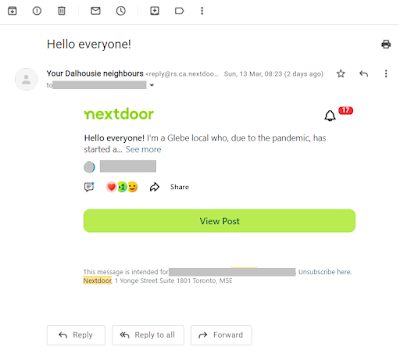
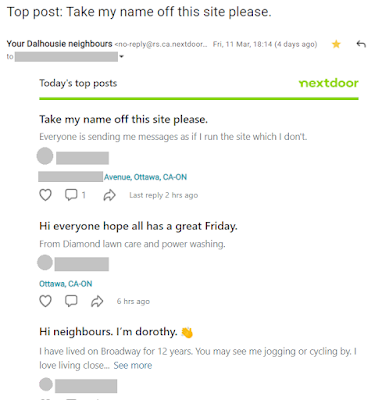
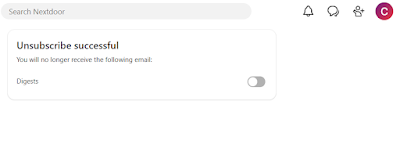


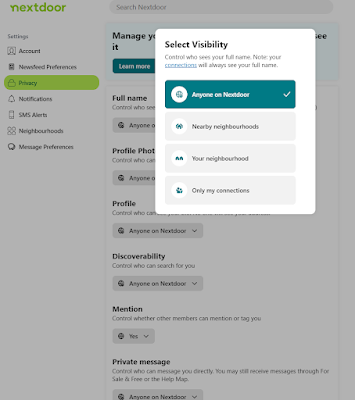

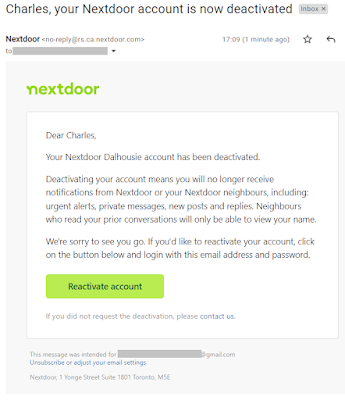
No comments:
Post a Comment